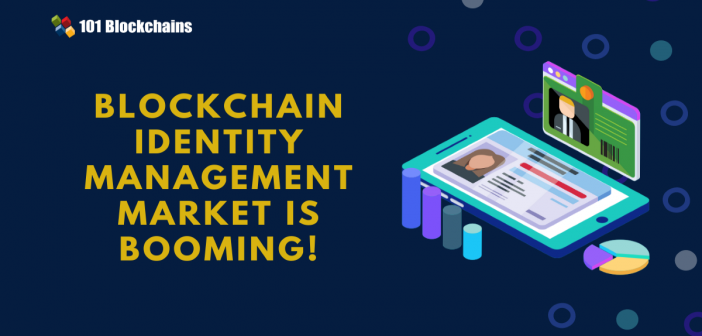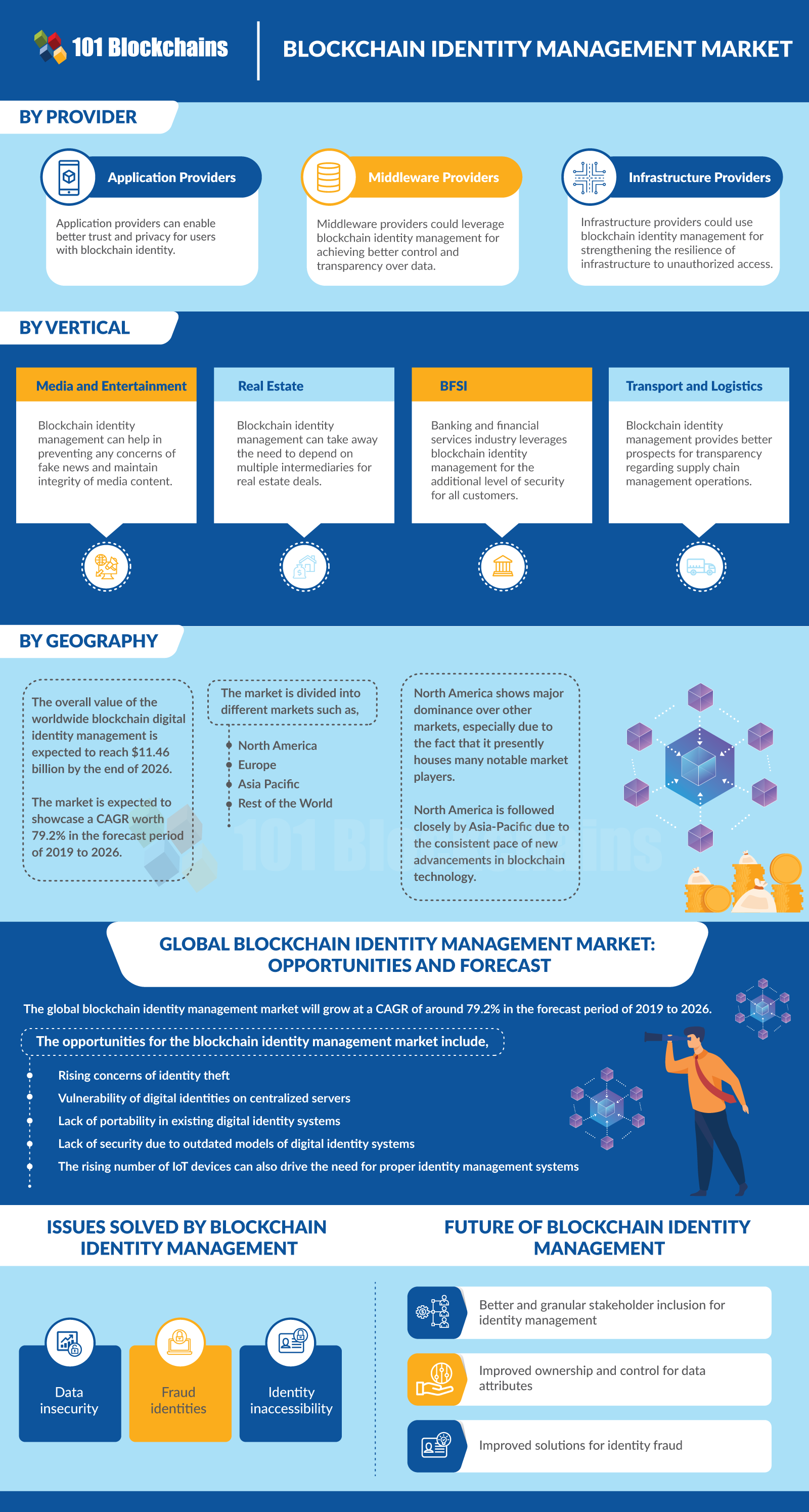This guide will explore blockchain identity management market, followed by a detailed reflection on the potential future for blockchain identity management.
The introduction of blockchain has been quite significant in driving the development of decentralized databases. Blockchain technology has been a critical intervention with impacts on controlling evolution of data among entities by leveraging a peer-to-peer network.
Therefore, the applications of blockchain have also extended towards the scope of identity management, thereby resulting in the rise of blockchain identity management market. So, it is reasonable to expect fundamental awareness regarding the topics involved in blockchain identity management. Many tech enthusiasts, students, blockchain professionals, and enterprises are eager to capitalize on the trends that are emerging in blockchain identity management.
At the same time, there are many questions surrounding the feasibility of the blockchain identity management trend. Let us try to find out more about blockchain identity management and the existing situation of identity management.
Enroll Now: Enterprise Blockchains Fundamentals Course
Expected Predictions for Blockchain Identity Management Market
Please include attribution to 101blockchains.com with this graphic. <a href='https://101blockchains.com/blockchain-infographics/'> <img src='https://101blockchains.com/wp-content/uploads/2021/02/Global-Blockchain-Identity-Management_02.png' alt='Blockchain Identity Management Market' border='0' /> </a>
The foremost factor that comes to mind is the reason to focus presently on the blockchain identity management market. The total value of the global market for blockchain digital identity management in 2018 was estimated to be around $107 million. However, the market is expected to showcase formidable growth at a rate of 79.2% over the period from 2019 to 2026.
Continuing like this, the worldwide market for blockchain identity management can reach around $11.46 billion by the end of the forecast period. Another notable blockchain identity management market trend reflects the dominance of North America in the overall market for blockchain identity.
Presently, North America houses the major market players alongside serving as the site for major blockchain technology advancements. In addition, the Asia-Pacific region is also one of the top candidates for a promising growth rate of blockchain identity management markets in the course of the forecast period. So, is blockchain the future?
All these trends outlined for the blockchain identity management market in 2020 establish a clear indication of its long-term potential. Therefore, you couldn’t find a better time than now to reflect on what blockchain identity management has in store for businesses and individuals all over the world. A deeper reflection into the roots of blockchain identity management can shed light on the potential future of this field.
Implications of Identity Management
Let us begin with the implications of identity management before exploring more details about blockchain identity management. Identity and access management is an integral requirement in modern business operations, especially with the rising demand for blockchain digital transformation. Identity management encompasses all the technologies and processes used in an organization for identification, authentication, and authorization for individuals to access systems or services in the concerned organization or the related agencies.
The most common example of identity management systems is evident in the facility of different levels of access, restrictions, and privileges for users in accessing software or hardware in an organization. National ID cards, driver’s licenses, and verification of birth certificates in governance are also ideal examples of identity management.
Why Consider Blockchain Identity Management?
So, why do we think of blockchain identity management market when there are so many existing blockchain applications of identity management? Well, the answer directly points out to improve. Identity management solutions work perfectly fine in the present settings. However, there are many prominent setbacks in existing identity management systems.
First of all, identity itself is a problematic concern because, in paper form, it is vulnerable to the issues of fraud, loss, and theft. Digital identity, on the other hand, can reduce the intervention of bureaucracy alongside improving the speed of the processes in organizations. Digital identity solutions are capable of ensuring better interoperability among departments and other organizations.
On the other hand, storage of digital identity on centralized server could render it vulnerable to hacking attacks. Speaking of vulnerabilities, over 600 million pieces of personal information such as credit card numbers or addresses have been subject to breaches, hacking, or leaks from the organizations.
Applications of Blockchain Identity Management
Most important of all, identity management systems are outdated and lack security. In addition, digital identities should be portable and suitable for verification without the limits of location, time, and approach for access. Therefore, the blockchain security protocols are perfect for identity management market for improving privacy and security in identity management solutions.
So, how can blockchain identity management make its way to the future with its applications across various domains? In order to find our answers to the future of blockchain identity management, it is important to look at the present applications of identity management in different domains.
Objectives of Enterprises for Blockchain Digital Identity Management
Enterprises are engaging in collection of sensitive information about customers and users alongside developing routine business data every day. Companies do not have any demarcation for storage of sensitive and less-sensitive data. As a result, enterprises are likely to face new business risks due to changing industry focus towards corporate IT responsibility and privacy-centric regulations like GDPR.
On the other hand, shifting data to highly resilient data vaults create setbacks in accessing the data for business decisions. Therefore, enterprises might look towards the blockchain business models specifically for identity management market for improving their information security capabilities without comprehensive investments.
Individual-Level Rationale for Blockchain Identity Management
On an individual level, the blockchain identity management market trend can present many notable promising outcomes. Identity is a prominently essential tool for the functioning of economy and society. Proper methods for identifying individuals and their belongings can help in fostering continuously growing societies and global markets.
Basically, identity refers to the combination of the claims regarding an individual, thing, or place. However, almost 1.1 billion people all over the world do not have any solution for claiming ownership of their identity. In addition, citizens with officially recognized instruments for identification also face issues of comprehensive ownership and control of their identity.
Growth in Number of IoT Devices
The drastic growth spurt in the blockchain identity management market worldwide would also build further momentum with the rise in the number of IoT devices. Presently, there are almost 7 billion devices connected to the internet, and the number can grow to around 22 billion by 2025.
On the other hand, majority of IoT technologies in the world presently don’t have strong identity and access management capabilities. With the deployment of IoT devices being a prominent concern while also focusing on implementing basic management capabilities, large scale IoT hacking incidents also draw attention towards proper identity management systems. Combining blockchain and IoT can solve all the issues that these devices phase and ensure a better security.
Issues Targeted by Blockchain Identity Management
So, can blockchain showcase the ability to resolve the issues that are prevalent in modern identity management solutions? The blockchain identity management market has emerged successful in resolving three important concerns associated with identity management. The three issues point out data insecurity, fraudulent identities, and inaccessibility.
Insecurity of Data
Data insecurity is one of the foremost concerns that emerge due to centralization of identity management. The storage of sensitive information on government databases with centralization is responsible for creating multiple points of failure. Hackers are more likely to attack massive, centralized systems that contain personally identifiable information of many user accounts.
Recent studies indicate that personally, identifiable information was one of the targets in almost 97% of breaches in 2018. Furthermore, the improved enterprise efforts and regulatory legislation for increasing cybersecurity resulted in exposure of 2.8 billion consumer data records.
Blockchain can solve a lot of issues of centralized databases. Here’s a guide to Blockchain vs Database to help you understand the differences.
Dealing with Fraud Identities
The next important concern that can qualify as a blockchain identity management market trend is the resolution of fraudulent identities. Users employ different identities to use services across different platforms. Subsequently, the weak relationship between digital and offline identities can also prompt the creation of fake identities.
As a result, fake identities can help in promoting counterfeit transactions and interactions, thereby leading to fraud. However, the advancements in cryptographic hashing and introduction of blockchain technology provide new tools for developing new identity management systems.
Inaccessibility of Identity
The blockchain identity management market could also be a formidable solution for around 1.1 billion people worldwide without any proof of identity. The complicated identification paperwork processes alongside the lack of access and knowledge regarding personal identity are some of the causes.
Furthermore, lack of identity proof also restricts individuals from accessing financial services. The growth of the blockchain identity management market can be highly crucial for introducing blockchain-based mobile identity solutions.
Looking at the Future of Blockchain Identity Management
How is blockchain able to achieve these outcomes for improving identity management? The blockchain identity management market relies prominently on the benefits of blockchain technology. It does not offer a central repository for hackers to steal data. In addition, all the transactions between enterprises and identity holders are documented on the blockchain, thereby providing comprehensive transparency.
The decentralized distributed ledger technology provides better flexibility for creating encrypted digital identities. The digital identities are easily accessible through mobile applications and can help in identity verification according to your requirements. So, blockchain does not only improve identity management but also offers better and secure ways for safeguarding their identity proofs.
Therefore, it is inevitable to consider the blockchain identity management market trend of growth as a promising factor for economic growth and enterprise productivity. At this point in time, it is inevitable to look at the potential trends in the blockchain identity management market. Here are some of the potential upsides that blockchain identity management could bring to the table in the future.
Improved and Granular Stakeholder Inclusion in Identity Management
One of the dominant highlights in the blockchain identity management market for the future refers to better stakeholder interaction. Digital revolution can definitely improve the lives of many citizens. Recognizing this factor, the City of Antwerp started discovering new approaches for service innovation. The single source of truth will be a prominent factor in blockchain identity management solutions.
The single source of truth can serve as an essential aspect for data integrity and self-sovereignty at the most basic level. Modern blockchain identity management can introduce solutions capable of integrating data instantly while offering access on a need-to-know or case-by-case basis. Such types of blockchain identity management solutions can ensure beneficial outcomes for insurance companies, hospitals, parents, and government agencies.
Better Ownership and Control over Data Attributes
As discussed already, ownership and control over data are some of the prominent factors driving the blockchain identity management market. Blockchain identity management solutions offer various advantages for stakeholders in the ecosystem of identity management framework. Users would have the final say in deciding the identity data attributes that they want to share with every organization.
Government agencies would continue to serve as a single source of trust of identities, albeit with the facility of identity validator to other organizations. The identity validator approach would result in a highly efficient and safer approach for identity management. Thus, blockchain for government is the perfect strategy to establish a trustable identity management system.
Better Solutions for Identity Fraud
The continuously evolving approaches in the blockchain identity management market also present promising solutions for identity fraud. The effect of data privacy and immutability of blockchain has continued to be important elements in blockchain identity solutions. In addition, blockchain technology is also open to innovation, thereby resulting in a wide range of opportunities for innovation.
It is reasonable to note that enterprise blockchain is not just suitable only for creating identities for people. Blockchain identity management solutions can focus on areas and objects also, alongside complete historical backgrounds. As a result, the scope of identity management solutions would increase profoundly in the future with blockchain capabilities.
Opportunities for Government and Businesses
While reflecting on the future of blockchain identity management market, it is reasonable to consider the business and government opportunities. Although the technology itself would take many years for complete maturity, blockchain will change the world with identity management solutions.
Majority of blockchain solutions and applications can enjoy almost 100% feasibility over the short-term. The capabilities of blockchain for improving application process speed and safeguards for client data can impose beneficial implications for insurance companies, credit providers, and banks.
Watch on-demand webinar on decentralizing the identity in blockchain with TrustID now!
Conclusion
So, it is clearly evident that the blockchain identity management market would score productively in the long term. With various dominant issues in the existing identity management systems, blockchain can introduce a sigh of relief for enterprises. At the same time, individuals and emerging technologies such as IoT device management can benefit from blockchain identity management.
Furthermore, the favorable prospects for blockchain in identity management across different sectors with improved functionalities also draw attention to it. Therefore, enterprises might look into the prospects of ideal digital identity solutions based on blockchain with assurance of credibility. If you want to explore more details about blockchain identity management, then start with the Blockchain Fundamentals course right now!



![Future of Blockchain: Predictions for 2022 [UPDATED] future of blockchain predictions](https://101blockchains.com/wp-content/uploads/2020/12/future-of-blockchain-predictions.png)

